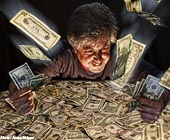 In dealing with the subject of money, medieval philosophers concluded that money cannot satisfy man since it is a mere means not an end. Money when considered as a end represents artificial riches that are removed from our desires. Thus, Odd Langholm notes:
In dealing with the subject of money, medieval philosophers concluded that money cannot satisfy man since it is a mere means not an end. Money when considered as a end represents artificial riches that are removed from our desires. Thus, Odd Langholm notes:
“As such they [these artificial riches] do not represent true felicity, for three  reasons. First, because their purpose is the supply of natural riches, in which one ought not to place one’s ultimate aim either, (and are thus, as it were, yet another step removed from it). Secondly, because they are a human institution, and if men changed their minds as to their use, they would be worth nothing. Thirdly, because they do not satisfy any immediate physical need nor any spiritual one.”
reasons. First, because their purpose is the supply of natural riches, in which one ought not to place one’s ultimate aim either, (and are thus, as it were, yet another step removed from it). Secondly, because they are a human institution, and if men changed their minds as to their use, they would be worth nothing. Thirdly, because they do not satisfy any immediate physical need nor any spiritual one.”
Cited from: Odd Langholm, Economics in the Medieval Schools: Wealth, Exchange, Value, Money and Usury According to the Paris Theological Tradition 1200-1350, (Leiden: E.J. Brill), 1992, p. 385-386.


